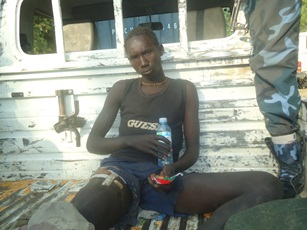South Sudan army capture suspected raider in Jonglei
May 27, 2012 (BOR) – South Sudan’s army (SPLA) disarmament operation in Jonglei State captured a suspected armed raider in Twic East County on Sunday, according to the county commissioner, Dau Akoi Jurkcuh.

Thalano Nyicho from Wucho payam [district], Pibor county, was brought before Jonglei State’s Peace Monitoring Committee, which was recently in the Twic East capital, Panyagoor. He confessed before his paramount chief, Nganthou Kawelojok, that he is just one of many youths who left Pibor for Twic East (among other counties) in April with the aim of raiding cattle and abducting children.
According to Akoi, the raider was cross-examined by his Paramount Chief in order to confirm his identity.
Commissioner Jurkcuh said the SPLA are pursuing other members of the Murle ethnic group who evaded the ambush.
The committee instructed the SPLA to deal with those criminals still holding arms in the bush, according to the commissioner.
Jonglei’s Comprehensive Peace Initiative, launched by South Sudan president, Salva Kiir, was organised and facilitated by a 23-member committee headed by Archbishop Daniel Deng Bull, appointed by Kiir, was signed on 5 May, two months after the general disarmament operation started in the state.
He said the wounded suspect, Thalano Nyicho, is now in police custody and will be moved to the state capital, Bor, for further investigations within the week.
SPLA soldiers also caught another suspected raider, Thamatho Ketchou, in Duk County on 14 January.
According to Ketchou, five raiders left Ngacibaraceth village to raid cattle belonging to the Lou-Nuer ethnic group but were intercepted at Akeer.
Ketchou, who was shot on his right thigh, described his arrest to journalists in Bor as follows: “five of us left Murle for Lou to raid cattle. When we arrived there, we were detected by people and they began shooting us. I was in front and so they shot me before I could shoot them. The rest of my colleagues ran, that is how I was caught.”
He said that he was originally from the Dinka-Bor ethnic group but had been abducted as a child by the Murle and could no longer remember his parents.
“If I go back to the Murle, I will tell my colleagues to stop raiding because it brings about death,” he explained.
In January the UN estimated 120,000 “may need relief assistance” due to the conflict in Jonglei since. There has been a long-running cattle-raiding/child-abduction feud between the Luo-Nuer and Murle ethnic groups which has escalated with the advent of readily available small arms. The proliferation of which is due, in part, to two decades of Sudanese civil war, which ended in 2005.
There has been scant information from the Murle Diaspora and the Murle in South Sudan on their perspective of the conflict, unlike the vocal Luo-Nuer who claim that the Murle have been driven to abducting their children as they are suffering from an infertility endemic; a view shared by Kiir.
According to the UN Environmental Program the Murle were in Ethiopia until the 19th century. Some remained their until the 1990s while others were driven west by local Nilotes. They established a homeland in Pibor county, Jonglei State in the 1930s, since which, environmental pressures have impinged upon their pastoralist lifestyle.
(ST)
